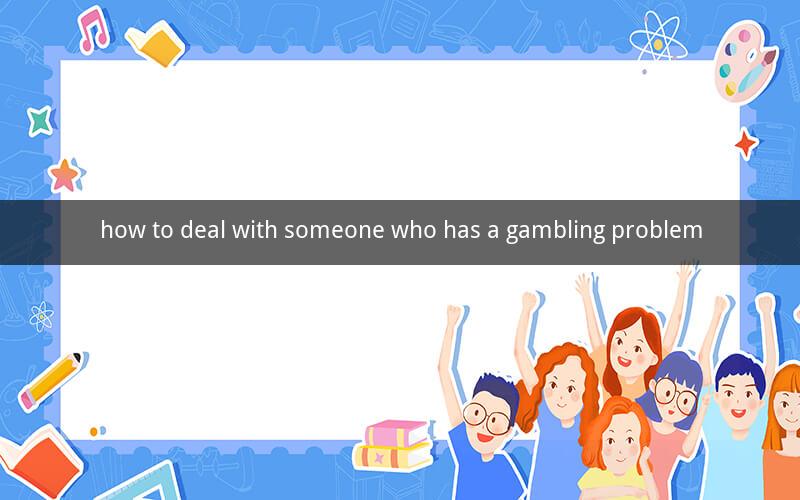
Table of Contents
1. Introduction
2. Understanding the Problem
3. Communicating with the Gambler
4. Encouraging Help and Support
5. Setting Boundaries
6. Professional Help
7. Supporting the Gambler in Recovery
8. Taking Care of Yourself
9. Resources and Support Groups
10. Conclusion
Introduction
Gambling can be an enjoyable and entertaining activity for many people. However, when it becomes an addiction, it can have severe consequences for both the gambler and their loved ones. Dealing with someone who has a gambling problem can be challenging, but it is essential to approach the situation with understanding and support. In this article, we will discuss how to deal with someone who has a gambling problem, covering various aspects such as communication, support, and professional help.
Understanding the Problem
1. Identifying the Problem: The first step is to recognize the signs of a gambling addiction. These may include hiding gambling activities, borrowing money, lying, and feeling anxious or guilty after gambling.
2. Understanding the Addictive Behavior: Gambling addiction is a complex condition that involves psychological, emotional, and social factors. Understanding these aspects can help in addressing the root cause of the problem.
3. Recognizing the Impact: The consequences of gambling addiction can be far-reaching, affecting relationships, finances, and mental health. Acknowledge the impact on the gambler and those around them.
Communicating with the Gambler
1. Choose the Right Time: Select a moment when both you and the gambler are calm and can have an open conversation.
2. Express Concerns: Share your concerns without being accusatory or confrontational. Use "I" statements, such as "I am worried about you" instead of "You are a problem."
3. Listen Actively: Give the gambler a chance to express their feelings and thoughts. Show empathy and avoid interrupting.
4. Avoid Blaming: Blaming the gambler for their addiction may make them defensive and less likely to seek help.
Encouraging Help and Support
1. Encourage Professional Help: Suggest seeking help from a therapist or counselor specializing in gambling addiction.
2. Find Support Groups: Many gamblers find solace and guidance in support groups such as Gamblers Anonymous.
3. Financial Support: If the gambler is in debt due to their addiction, consider helping them explore debt consolidation options or seek professional financial advice.
Setting Boundaries
1. Establish Clear Expectations: Set boundaries regarding financial contributions and other support you are willing to provide.
2. Enforce Consequences: If the gambler continues their behavior, be prepared to enforce consequences, such as limiting contact or severing financial ties.
3. Seek Professional Guidance: Consider seeking the assistance of a therapist or counselor to help you navigate this process.
Professional Help
1. Therapy: Individual therapy can help the gambler address the underlying issues contributing to their addiction.
2. Counseling: Group or family counseling can provide support and guidance for both the gambler and their loved ones.
3. Support Programs: Consider joining a support group such as Al-Anon or Gam-Anon to learn from others experiencing similar challenges.
Supporting the Gambler in Recovery
1. Encourage Accountability: Help the gambler stay accountable to their goals and commitments, such as attending therapy sessions or support group meetings.
2. Celebrate Successes: Acknowledge and celebrate small victories in the gambler's recovery journey.
3. Be Patient: Recovery is a long and challenging process. Remain patient and supportive throughout.
Taking Care of Yourself
1. Seek Support: Do not hesitate to seek support for yourself, whether from friends, family, or professionals.
2. Practice Self-Care: Engage in activities that promote your mental and physical well-being.
3. Limit Exposure: Limit your exposure to gambling-related activities and environments to avoid triggering your own anxieties or fears.
Resources and Support Groups
1. National Council on Problem Gambling: This organization provides resources, hotlines, and support for individuals affected by gambling addiction.
2. Gamblers Anonymous: A worldwide fellowship of individuals who share their experience, strength, and hope with each other, to solve their common problem and help others to recover from a gambling problem.
3. Financial Counseling: Consider seeking financial counseling to help manage debts and prevent future financial strain.
Conclusion
Dealing with someone who has a gambling problem can be a challenging experience, but it is essential to approach the situation with understanding and support. By following these steps, you can help the gambler on their journey towards recovery while also taking care of yourself. Remember that seeking professional help and joining support groups can be incredibly beneficial for both the gambler and their loved ones.
Frequently Asked Questions
1. What are the signs of a gambling addiction?
- Signs include hiding gambling activities, borrowing money, lying, feeling anxious or guilty after gambling, and neglecting responsibilities.
2. How can I help someone with a gambling addiction?
- You can help by being supportive, encouraging professional help, setting boundaries, and joining support groups.
3. What are some effective treatments for gambling addiction?
- Effective treatments include individual therapy, group or family counseling, and joining support groups.
4. Can gambling addiction be cured?
- While there is no cure for gambling addiction, it can be effectively managed with treatment and support.
5. How can I support someone in recovery from a gambling addiction?
- You can support them by being patient, celebrating successes, and encouraging accountability.
6. Is there a support group for loved ones of a gambler?
- Yes, organizations like Al-Anon and Gam-Anon provide support for loved ones affected by a gambling problem.
7. What should I do if the gambler is in debt?
- Consider helping them explore debt consolidation options or seek professional financial advice.
8. Can gambling addiction affect my own mental health?
- Yes, witnessing the effects of a loved one's gambling addiction can be emotionally and mentally taxing.
9. How can I find a therapist specializing in gambling addiction?
- You can ask for referrals from support groups, mental health professionals, or search online directories.
10. What resources are available for individuals affected by gambling addiction?
- Organizations such as the National Council on Problem Gambling and Gamblers Anonymous provide resources, hotlines, and support.